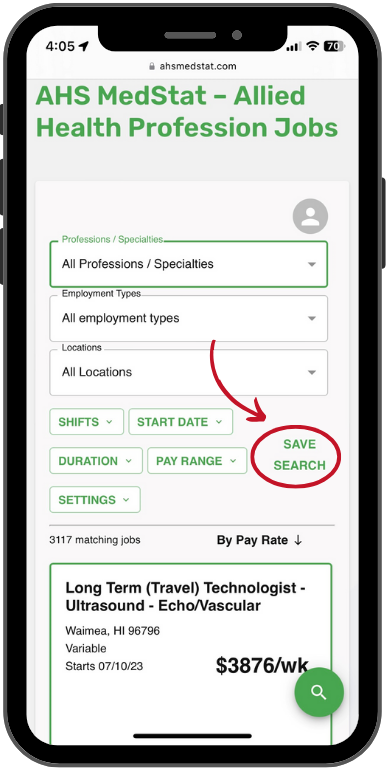There are many types of allied health jobs out there. After all, allied health careers account for an estimated 60% of the entire healthcare workforce. Whether you’ve been in the industry for a long time or are considering a career in the allied health field, you might be wondering about the pay and how to improve yours. In this article, we’ll discuss some of the top paying specialties, what affects your pay, and why allied health travelers tend to make more than staff hires.
If you’re ready to get started as a traveler, browse our job board and contact our recruiters today!
What Are Allied Health Jobs?

In case you’re not familiar with the term “allied health,” it’s a category for healthcare workers that aren’t doctors or nurses. Instead, allied health professionals assist nurses and doctors, both directly and indirectly, with patient care. There are many different types of allied health jobs and the careers vary widely on what type of work is involved, the type of patients seen, as well as the education level required. For instance, there are many allied healthcare jobs you can get without a degree (though the higher paying ones do tend to require a college degree).
Why Are Allied Health Jobs In Demand?
There are a lot of allied health jobs out there. Allied health careers are some of the largest growing healthcare careers in the U.S. There are many reasons for this. One is that allied healthcare professionals provide a variety of different types of specialized care to patients. Also, we currently have a pretty big healthcare workforce shortage. Combine this with an aging population with more and more chronic conditions and this creates a huge demand for healthcare workers.
Some of the Best Paying Allied Health Jobs
There are a number of allied health jobs available. However, like with any industry, some careers pay more than others. Some of the highest paying allied health careers include:
- Physical therapists
- Occupational therapists
- Radiation therapists
- Speech language pathologists
- Nuclear medicine technologists
- MRI technologists
- Respiratory therapists
- Dieticians/Nutritionists
- Cardiovascular techs
- Lab techs
- Surgical techs
When it comes to demand, there are several careers expected to have high job growth by 2030, including:
- Respiratory therapists – 30% growth
- Physical therapists – 26% growth
- Occupational therapists – 22% growth
- Lab techs – 19% growth
What Affects Pay for Allied Health Jobs
There are several things that affect pay and salary for allied health jobs, including geography, facility, experience, and your credentials/specialty. Knowing this allows you to find jobs that pay the amount of money you’re looking for.
Geography
Different places have different average salaries. This is true both in general and also for specific careers. For instance, in high cost of living areas, usually the salaries for most jobs are higher than somewhere with a low cost of living. However, it’s also true that some areas may pay certain professionals more because of demand. For instance, while there’s a national healthcare worker shortage, some states are worse off than others and, therefore, may pay higher for allied health jobs.
Facility
Different facilities also pay different wages. While they’re usually close to stay competitive with each other for qualified professionals, one facility may offer a different pay rate than another. There are many policies that go into staffing and salaries, so some might be willing to pay more if you have certain certifications or a particular background than others. It also depends on how much they need a position filled, as facilities that are more desperate may pay a little more than those who are simply looking for an added team member for future planning.
Experience
Like with most other careers, the amount of experience you have also factors into your pay. More experienced professionals tend to make more than those just starting out. This is to account for the reduced amount of training you need, your ability to teach others, and the value of your experience when it comes to performing your job duties.
Specialty & Credentials
As we mentioned, there are certain allied health specialties that make more than others. This usually comes down to demand, education, and other factors. However, it’s also important to note that the credentials you have will also usually affect your pay for allied health jobs. For instance, if you have certain certifications, you might be able to make a higher salary than someone who doesn’t.
Why Allied Health Travel Jobs Pay More
Another option you have to make more is to find allied health travel jobs instead of permanent positions. Travelers tend to make more than permanent staff for many reasons, including:
Filling in for Short-Term Needs
One reason that allied health travel jobs tend to pay more is because the traveler is filling in temporarily for short-term needs. This usually means that there’s something that has happened to make the facility in need of your services. For instance, if a permanent employee quits, takes long leave, or if the facility has an unexpected increase in the number of patients they’re treating. This creates an immediate need where it may not be feasible to hire someone permanently before they are understaffed. Therefore, facilities are often more willing to pay travelers more for the prompt arrival and inconvenience.
Taking Allied Health Jobs in Places with Healthcare Worker Shortages
With travel allied health jobs, that also means that a lot of the available jobs are in places where there are healthcare workforce shortages. This means that many travelers are regularly going to places where their skills are in the highest demand, which tends to drive the pay up as well. For instance, there may not be a lot of need for several physical therapists in a rural community, but in a larger city they may not have enough to go around and help with all the patients who need treatment.
Traveling to Higher Paying States
Similarly, many travelers choose where they go wisely. In particular, they may choose mainly allied health travel jobs in the highest paying states for their career. This changes depending on things like time of year and demand for a particular specialty. However, as we mentioned, high cost of living areas tend to pay more than low cost of living areas. So, states like Hawaii, California, and Massachusetts are usually on the higher end for allied health salaries.
AHS MedStat – Medical Staffing Agency Specializing in Allied Health
If you’re an allied health professional looking for great pay and adventure, get in touch with our team at AHS MedStat now. We are a medical staffing agency specializing in helping allied health pros find travel assignments that are perfect for them. Our recruiters get to know you and what your goals are so we can tailor the experience to you. We also offer superior support throughout your time so you’re never left with unanswered questions. Contact our recruiters or browse our job board to get started today.


